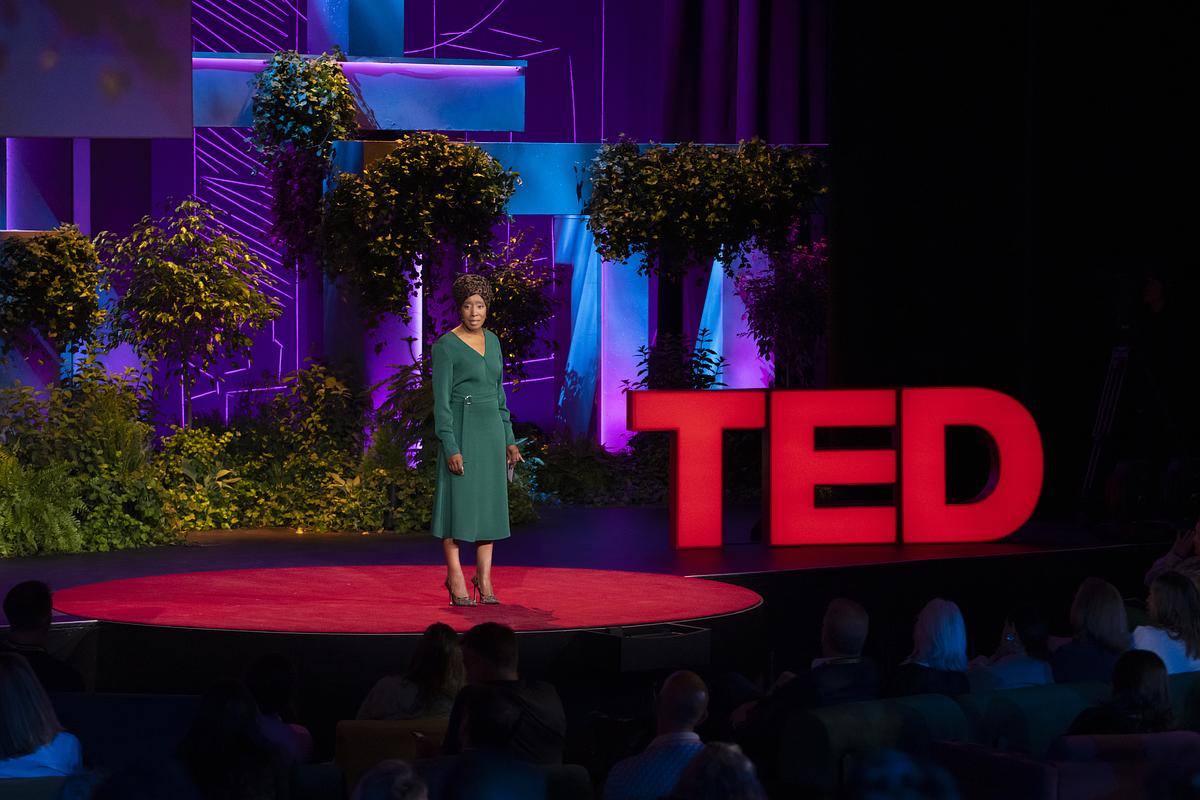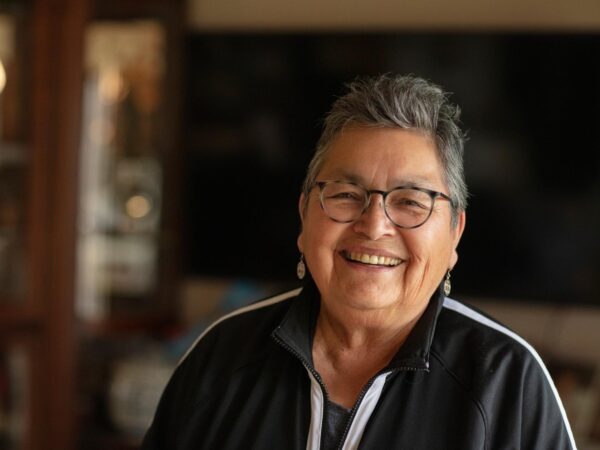
Laprisha Berry Daniels is the Executive Director at Detroiters Working for Environmental Justice. Daniels is a public health social worker who is interested in focusing on harm-reduction when dealing with the climate crisis. She specializes in developing interventions to help to improve the health and wellbeing of communities.
In her talk on Wednesday, July 12, Daniels said she was inspired by her family’s move to Detroit during the Great Migration. She looked to the past to figure out how to help us navigate the future with three pillars — acceptance, aid, and adaptation.
Daniels sat with Great Lakes Now to discuss how social work plays an important role in climate change, and what Detroit can do to help prepare for the changing future.
Could you tell us a bit about the organization Detroiters Working for Environmental Justice?
Daniels: Detroiters Working for Environmental Justice was the first environmental justice organization in the state of Michigan. It was founded some 30 years ago with the purpose of amplifying the voice of community members when decisions were being made that would impact their health and well-being. Specifically decisions around the natural and built environment. That was the work then, that is the work now. Really to bring voices to the table that typically are excluded from the table.
Was there a particular event or something that happened to inspire this?
Daniels: There was. So, there was a summit that happened in D.C., where a lot of leaders and activists got together and came up with the 17 Principles for Environmental Justice. Then they were charged with going back to their own communities and figuring out what they would implement in order to support those principles. Donele Wilkins met with a few other folks around her kitchen table, starting 30-some years ago. And then they formally made it into Detroiters Working for Environmental Justice to support communities in their efforts to strive for fair treatment.
Why Detroit? Why do you think Ted chose this city for its climate summit, and what does that signify to you?
Daniels: Detroit is a city that is full of innovation, creativity, and opportunity. We are an international city–so there are lots of reasons that it would make sense. People always say that Detroit put the world on wheels, and thinking about how that juxtaposition of the industry, the automotive industry, being part of the problem in some ways, but also being part of the solution, it made sense to center this climate talk here. Donele Wilkins, who now works with Green Door Initiative, always says: now we’re moving from Detroit being the Motor City, to the solar city. There’s a lot of work that’s being done around sustainability and environmental action and environmental justice, where we’ve really set precedence for a lot of the work that’s happening around the country, and around the world.
What do you think is the role of psychology or social work in environmental justice?
Daniels: I actually had a really good conversation with someone yesterday about this. Some of my talk was about emergency preparedness, and there’s this piece that has to do with infrastructure–that’s really important. And there’s a piece that has to do with having efficient alert systems, which is really important. But there’s also trauma that comes along with experiencing a crisis, and climate crises are included in that.
When folks have had, for example, damage to their homes from heavy rain events, when it rains again, that brings up those same issues for them. So we have to be mindful of the psychological effects that the climate crisis and climatic events have on folks, and be able to hold them. And so as we’re coming up with strategies for climate change and the effects of climate change, we have to pay attention to all aspects of health. So emotional health, physical health, spiritual health, psychological health–all of those factors have to be considered.
In your talk, you mentioned three things that you think are important to keep in mind when preventing harm during climate crises. Could you elaborate on these for us, and how you came to develop these?
Daniels: It was from thinking about how folks had to cope with coming here to Detroit, during the Great Migration. We think of climate, it feels very new and catastrophic. But this is not the first time folks have had to deal with climate change. We know people that have dealt with climate change, when you move from one region to another, you are dealing with climate change. It’s a little different because it’s in a way self-imposed, but the strategies you use are the same. So, it really did come from thinking about, how did folks in similar situations deal with this? Then, how can we use those lessons to apply to the situation that we’re in now, although not self-imposed? Those same strategies work. So the ideas of acceptance, aid, and adaptation just made sense.
Are there any recent examples of how mutual aid has really helped Detroiters, maybe in the last few years?
Daniels: We did have a really heavy rain event in 2021, and it was a heavy lift for most families that experienced that flooding. A lot of folks, that affected their basements. If you’re from Michigan, then you know what types of things are kept in the basements: photo albums, heirlooms, your Christmas ornament from your great-grandmother. So there was a lot of loss of things, but it was also very emotional. And there was a need for cleanup efforts. And we found that congregations, neighbors, friends, and community-based organizations were really part of those cleanup efforts.
Unfortunately, the city is not set up yet to deal with those types of crises. So they really relied on those social supports to get them through those crises. I mentioned there’s that emotional piece that comes with losing things. After that, you saw a community network, with some healing spaces for folks and other community-based organizations across the city.
A lot of therapists recognize that this is a different type of crisis of trauma and loss. They were sharpening their skills around that specific type of loss. And then places of worship as well were providing healing spaces for folks, as well as that sort of physical care for cleanup efforts. We also increased our ability to send community health workers into communities, in order to do assessments around asthma exacerbation, because we know with those heavy rains there’s going to be mold in the basements. Even though there are cleanup efforts, those were some of the health impacts we’re seeing.
What are the most immediate things, in your opinion, that need to happen in order to prepare the city for these upcoming climate changes?
Daniels: One of the big things that I hear from community members is an alert system. A lot of the climate crises that we’re experiencing, we haven’t experienced in the past. Just thinking about the impact of the wildfires in Canada, and how it impacted our air quality to the point that it was hazardous, and folks literally thought that it was just a cloudy day. We didn’t have a good way of getting information to residents about that. There were slow responses from local health departments, as well as the state. It was slow for communities to get information. And because we hadn’t had this crisis, folks didn’t know where you’re supposed to get the information from. And so we really don’t have, in Michigan, but definitely not in Detroit, we don’t have a good alert system. And so I’ve heard from a lot of community members: where do I get information? How do I know when there’s a crisis?
Similar with flooding, when roads are closed: how to get back home? Having alternative routes. What’s safe and not safe to do? I mentioned in my talk that there were folks kayaking and swimming down residential streets, and because we’re not used to that type of rainfall, we’re not thinking about the debris that could hurt you, even if you are in a kayak. These are not safe spaces to be in. But we haven’t had that type of education. We know what to do in a tornado, we know what to do in a snowstorm. But we really didn’t know what to do in a flood. And we don’t know what to do when air quality is that bad from wildfires. And we know that those events are going to continue to happen and we have to have a way of better communicating with residents around that.
What has the most impactful part of this week been for you?
Daniels: Part of it has been folks coming up to me and saying: I want to learn more about what you do. Maybe there are opportunities to work across states, or across nations, on some of these things. Some of the wins that we’ve had in Detroit, that others are looking at, in terms of the environmental justice movement–those things that I take for granted. People say, you’re never a profit in your own land, and I think you take for granted how much knowledge you have, and how much you have to contribute to other people’s fights, because you’re very focused on the fight in Detroit. So that’s been really eye-opening.
Then, we were able to bring youth to part of the summit, and so that was really fun to see them hear different perspectives, think about climate differently, and think about environmental justice differently by hearing from folks like Justin Pearson.
What are you hopeful or cautiously optimistic about?
Daniels: I’m never cautiously optimistic. I’m just optimistic. In general with Detroit, I am seeing some movement toward silos being broken down. And that makes me hopeful and optimistic. Sometimes in the environmental justice movement in particular, we will vilify industry or local government, or industry doesn’t want to be involved with those activists. I’m seeing that breaking down somewhere we are really at tables, sharing our experiences and valuing each other’s perspectives. We don’t always agree, but at least we’re in the same space and willing to listen. That, to me, makes me hopeful and keeps me optimistic because we know that as big as this problem is, in terms of environmental justice or climate, that it is necessary for all of us to work together.
Catch more news at Great Lakes Now:
TED Countdown: BlocPower CEO Donnel Baird on greening America’s buildings, improving communities
The TED Countdown Summit is coming to Detroit
Featured image: Laprisha Berry Daniels speaks at SESSION 2 at TED Countdown Summit. July 11-14, 2023, Detroit, MI. Photo: Nick Hagen / TED




